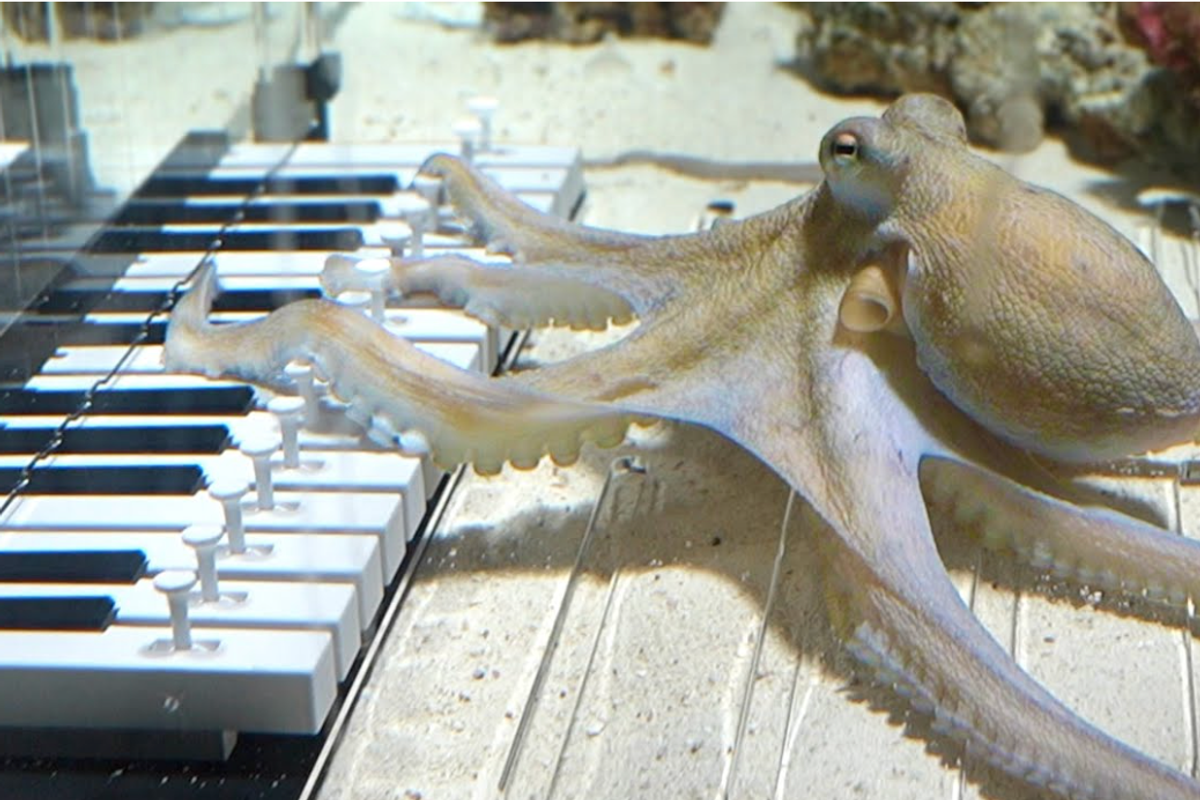Musician shares how he taught an octopus to play the piano in six months
It’s hard to learn piano, especially when you don’t have ears.

Tako is able to hit notes with all eight tentacles.
It’s hard to imagine humans having anything in common with an octopus. The differences are obvious: an octopus has no bones, is aquatic, has tentacles, etc. Yet, there are some similarities between humans and octopuses. A musician found a surprising trait that octopuses and humans share: the ability to play the piano.
Swedish musician Mattias Krantz rescued a live octopus from a fish market, which he named Tako after the Japanese takoyaki dish. He rescued the animal in order to conduct an experiment to see if he could teach it how to play the piano, sharing his findings and failures on YouTube. After six months of trial and error, bonding, and training, Krantz developed an aquatic pull-lever keyboard for Tako to play on and jam along as Krantz played the guitar.
“I almost forgot sometimes that Tako was destined to become someone’s dinner and now we’re making music together,” said Krantz on YouTube.
Krantz went through a lot of trouble to develop a keyboard that Tako could play underwater and to develop an interest within Tako to play it. First, he was able to create a waterproof keyboard that Tako could play by pulling levers that would push down the keys rather than requiring Tako to press down the piano keys himself.
Secondly, and arguably more difficult, was teaching and coaxing Tako to play his new instrument. Krantz tried to use lighted keys, fake crabs, and vibrations in his tank (to represent sound as octopuses don’t have ears) to get Tako to hit various keys and notes. In spite of all these new treats, stimuli, etc., it was a struggle to get Tako motivated to pull a lever to hit a minor key much less develop any sort of melody.
- YouTube youtu.be
All seemed to be failures until Krantz developed a “crab-elevator” that would lower a treat to Tako as he pulled the specific levers to each key. After that, it was a matter of repetition and bonding to get Tako to “play jazz” along with Krantz. Now, whether he’s aware of music itself or not, Tako has learned to play with his musical toy.
While this experiment is rather wild, some may not be surprised at Tako’s ability. Octopuses have been shown to use tools and are able to distinguish humans from one another. They’re able to open jars, solve puzzles, and are considered aquarium escape artists. In spite of physical differences, octopuses share similar intelligence genes that humans have and a Brazilian study suggests that they can even dream. Partially because of their intellect, there is a growing group of people questioning whether to eat octopuses.
- YouTube youtu.be
There are also scientists who believe that, by studying octopus brains, we might have a better understanding of our own.
“The octopus is a special invertebrate. By studying how the brain functions in octopuses, we can maybe learn new tools to interfere with our nervous systems or to understand our nervous system better,” Nikolaus Rajewsky, PhD, scientific director of the Berlin Institute for Medical Systems Biology of the Max Delbrück Center (MDC-BIMSB) told GEN.
So what about Tako? While Krantz initially planned to return him to the ocean, he decided to keep the domesticated octopus as his pet, companion, and occasional keyboardist for impromptu music jams. Whether the experiment proved anything or not, it developed a lasting bond between man and cephalopod.






 a man sitting at a desk with his head on his arms Photo by
a man sitting at a desk with his head on his arms Photo by  Can a warm cup of tea help you sleep better? If you believe it, then yes. Photo by
Can a warm cup of tea help you sleep better? If you believe it, then yes. Photo by 
 A happy Gen X couple have patience for younger generations, like Gen Z.
A happy Gen X couple have patience for younger generations, like Gen Z.
 A group of friends chatting wearing masks.via
A group of friends chatting wearing masks.via 
 Some stray cats wander from home to home like a drifter.
Some stray cats wander from home to home like a drifter.  Stray cats should be spayed and neutered.
Stray cats should be spayed and neutered. 
 A woman getting her nails painted.via
A woman getting her nails painted.via
Curvy-and-proud newscaster takes the wildest viewer comments turns them into pure comedy gold